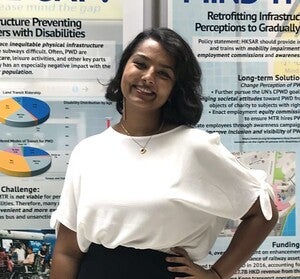Welcome to the Community-Driven Archives (CDA) Initiative blog! We start the final reflection posts from our graduating student archivists series with an entry from Myra Khan. Myra has been such a constant on the CDA team that it seems unimaginable that she will not be here come the upcoming Fall semester. As I have stated previously, Myra has contributed so much to the CDA blog that I will miss her voice and participation in this blog. We wish Myra much success as she transitions into her life away from Arizona State University and the CDA team and applies to law school to become an amazing lawyer. We will miss you, Myra!

Archives are often thought of as static or boring entities, ones that do not encourage creativity or flexibility. Traditional institutional archives usually reinforce this perception. However, my work proved to me that archives can be anything but. If I’ve taken anything away from my experiences with CDA, it’s that archives are fluid, dynamic, and human. Collections hidden away in institution basements under lock and key benefit no one. Archivists who don’t make an effort to connect their work to all generations are doing the field a great disservice.
First and foremost, archives are a medium for storytelling. In order to tell a story, there needs to be both an active narrator and an engaged listener. It is both parties who make the storytelling possible and, more importantly, meaningful. When we curate collections, we should consider what each material can communicate not just to future generations, but also those present.
Whose stories are we telling? Whose stories have not been told? Why are we telling these stories and not others? How should we tell these stories? Who needs to be involved in the process of telling this story? Who will be receiving the story? What power is held in the materials we hold? These are the questions which frame community-based archiving.
Like many museums, even library archives should seek to create interactive projects that make community members from all backgrounds feel properly engaged. This goes beyond simple education opportunities. Events and materials which encourage community members of all ages to be creative, reflective, and hands-on play a crucial role in creating lasting connections between individuals and archives histories, both their own and those foreign to them.
I find this community-oriented storytelling framework useful not simply in archives, but also in many other fields, such as law. Just like how archival collections have been biased in telling only narratives of the dominant, the law too has been plagued by stories of only one side, stories which are rooted in falsehoods and years of historical trauma. The celebration of multiple-perspective storytelling can help our legal system create a system of truth, justice, and equality that it is meant to stand for.
As I work towards applying to law school, I will continue to guide my work through the equitable storytelling narrative. Formal archivist or not, my years with the CDA will undoubtedly continue to have a crucial influence on my professional work in the future.
Contact me, Jessica Salow, with feedback at Jessica.Salow@asu.edu as I would love to hear from you your thoughts regarding the work we here at ASU are doing in community archiving around Arizona. We also want your feedback on what you would like to see from us in future blog posts. And if you would like regular updates from the CDA team please follow our CDA Facebook page or the CDA Instagram page to keep abreast of the virtual events we do monthly. We have some amazing events coming up in February 2021 so please check out our social media pages for more information. And please visit our website and our connect page for more information regarding the work we are doing around community-driven archives at ASU Library and with our community partners in Arizona.
See you soon!